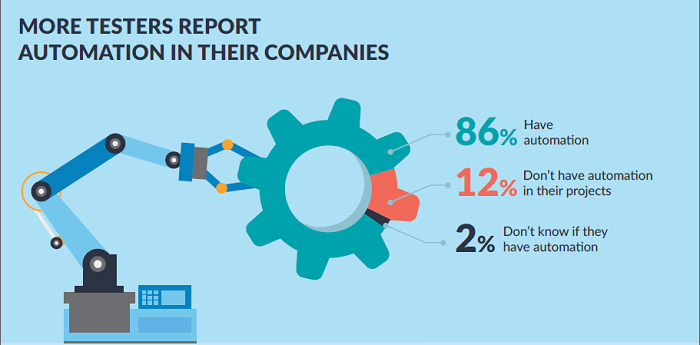When you are starting your career as QA/tester or switching your career to software testing, the following concerns pop up in your head:
What are QA Tester career paths?
Is software testing a good career path to follow?
What is career growth of software tester?
What path should I take after spending a few years in software testing?
so on and so forth…
These concerns are especially true when you are completely new in software testing or when you chose a wrong career path in the past and now you don’t want to make another painful mistake.
This is normal. People are afraid of failure and no one likes to deal with uncertainty (me included).
Choosing the right career path, to some extent, is to make or break your life.
Choosing the right career path is tough, but it doesn’t mean that you blindly choose a career path without knowing where it will lead you to. In this post today, I would like to give you some QA tester career path ideas, so that you can choose to follow and lead you to your life success.
But before going into the details, here are some important points to note:
A career path is not a “fixed” path
One of the reasons people are worried too much about their career paths is because they think career path is something “fixed”. It means that there’s only one career path in their lives and they have to choose the right one right from the first time. It’s like as if they choose the wrong one, they’re done. They see the career path like a non-stop train, once they jump in, they can’t jump out.
No, it’s not like that.
There’s no the so-called fixed career path and it’s okay for me if you can’t make it right the first time.
My first job 10 years ago was a webmaster and I set myself software development as my career path. Now I’m going on the path of software testing and I’m enjoying it. What I did is that I gave myself a room to change career path when needed…and you should do the same too.
Start with the end in mind

I sometimes receive emails from fellows who ask for advice to switch to software testing and the reason is just because they are sick of their current jobs. They have done their jobs very well for many years and now they are tired of it. They’re desperately looking for a new career path and don’t care where this will lead them to.
Stephen Covey in his famous book “7 habits of highly effective people” mentioned that effective people always “start with the end in mind”. He explained:
It focuses on what you want to be and do. It is your plan for success. It reaffirms who you are, puts your goals in focus, and moves your ideas into the real world. Your mission statement makes you the leader of your own life. You create your own destiny and secure the future you envision.
While it’s impossible to predict things in the future or choose the right career path the first time, it’s always recommended that you should know what you are trying to achieve or what your goal is.
Don’t know what you want to be and do in your life? Go and find it.
Alright, so let’s jump right into the main part of the post today:
Common QA tester career paths you can choose from
In order to give you a better understanding of possible career options in software testing, I list out some common paths so you can choose from. Some of these paths I have experienced and some not (but my friends do and they have had great success)
Technical path
Specifically, I’m talking about test automation path.
In a nutshell, automation engineer is responsible for writing automated scripts to run the test automatically (James Bach called it automated check) instead of doing the test step-by-step manually.
If you are good at programming and writing code is your interest, you may want to go on automation path. However, it’s necessary to understand that:
- Even though most people refer automation as “automation test”, automation has little to nothing to do with testing. Automation test is more about software development in which you have to write code, run it, debug it and maintain it from build to build.
- While automation test often does not require as much programming skill like in a software project, it still requires a certain level of programming to do the job well.
- Automation is not an advancement of manual testing. It’s just another test approach to help test more efficiently
The career future of automation path?
These days people expect to deliver software faster and continuously. Automation has become the hottest trend right now and for many years to come because automation is there to solve that problem (of course, if we do it right)
According to State of Testing Report 2015, 86% of companies in their survey do automation test in their project

TestTalks host and founder of test automation blog joecolantonio.com shared his expertise and predictions on how to succeed with test automation awesomeness in 2016. You can take a look in video below:
Here’s the automation career path may look like:
Junior tester/junior automation engineer > Senior automation engineer > Automation lead > so on
If you have solid programming skills or like technical stuff, you may be the next automation expert.
Non-technical path
Test automation is everywhere and dominating the software testing industry. It looks like automation is the only path tester can pursue.
How’s about manual testing, a non-technical path?
For those who are manual testers or consider yourself as non-technical guys, I hear you…I’m a non-technical guy too.
If you cannot code or writing code is not something you are interested in, you can always go on the non-technical path. Basically, if you follow this path, you will have to prepare yourself to do following activities: test design, test executing, bug finding and reporting, test planning, test reporting, etc.
Are these easy jobs to do? Of course not. While you can approach or be familiar with these activities, mastering these skills and doing these jobs effectively are really challenging. Needless to say, these activities always play a core role in any software testing project.
Actually, there’s a myth these days about manual testing dying and it’s being replaced by automation. What I can say is that manual test is never dying and it still has its position in testing.
What makes manual testing so important and hard to be replaced by machine is that it’s the manual tester can discover problems or potential problems in the system by exploring, exercising the system and asking the good questions.
Here’s the path of non-technical path:
Junior tester > Senior tester > Test leader > Test manager > and so on
Managerial path
Managerial path is one of the most popular paths you should definitely consider to follow.
What’s great about management?
If you follow this path, you may have titles as Test leader, Test manager, Project manager, QC manager, QA managers, etc. It means that you are now a boss (big or small depends on titles :-). You now have the authority and can build influence in the outcome of your project.
By following this path, those who used to experience a bad manager in the past will have good opportunity to become a better manager, the manager you always want to be.
The managerial path is suitable for those who are very good at communication and managing projects. You will need to see things as big pictures instead of worrying that you haven’t found any bugs in a week.
While the management path is a transition suitable both from technical or non-technical testers, I found that many “technical testers” are not interested in management. I don’t know why…it may be because their brains are wired with technical stuff and they would spend hours of debugging or writing automated scripts rather than 5 minutes talk with management or to handle conflicts between team members.
Here’s the path:
Junior tester -> Senior tester -> Test Leader > Test Manager/Project Manager > Test Director > and so on
How long does it take to get there?
There’s no exact answer actually. It depends on organizations, your skills and luck sometimes.

Image credit: http://dilbert.com/strip/2015-01-19
Test specialist path
Basically, test specialist is still a tester, but he will specialize in testing on a specific domain, such as performance testing, network testing, security testing, electrical testing, etc. As a test specialist, you will do a thorough testing in a specific area which requires certain knowledge or skills.
This career path is also perfect for those who have many years of expertise in a specific domain and now want to switch to a new career path without having to waste many years of experience earned before.
Needless to say, since there are not so many people can become specialists, test specialists are often the one indispensable in the company.
Independent test consultant path
When you are in test long enough and have a decent knowledge and skills, you can also consider being an independent consultant. The main role of a consultant is of course…consulting (in other words, giving sound advice). According to Study.com,
Consultants are paid to share their expertise and knowledge to help businesses attain goals and solve problems. Businesses often hire consultants to supplement their staff and save the costs of hiring a full-time employee. As a person new to the company or organization, consultants view the situation from a fresh perspective

Even though being a consultant requires many years of experience and many different skills, don’t be discouraged by that. If you are very good at a specific skill and have experience in solving the problem with your unique angle, you can become a consultant.
If you love testing but you do not want to live your entire life as full-time employee, independent consultant is a career path worth pursuing.
For those who want to step into this consulting path, I recommend this book from Gerald Weinberg: The Secrets of Consulting: A Guide to Giving and Getting Advice Successfully
Freelance tester
If 9-5 job does not interest you and freedom is something you are looking for, being a freelance tester is not a bad option at all. As a freelance tester, you can test anytime, anywhere in the way you like. You are now your own boss. You can imagine how cool that would be.
One of the issues with freelance work is that income may not as stable as a full-time job. Sometimes you have projects to test, sometimes you don’t. If you are new in software testing, I recommend you should take freelance work as your part-time job. Once you build your good credibility and relationship and your projects are stable, you may then consider if you want to go this path full-time or not.
Being a freelance tester is not too difficult. Actually, I’ve just recently published a complete and step-by-step guide to help you become a freelance tester on uTest. Go ahead and try it out.
Which path is the best one to follow?
I would love to give you the answer to this question, but I can’t. There’s no single best path or a path fitting everyone’s need.
People are different…different countries, different skill sets and different goals in life.
…so, don’t expect people go on the same path.
As you may notice, I have intentionally left out information such as salary/income part in the paths above. The reason is that I find focusing too much on salary thing or letting salary lead your career path is more harm than good. Even though this sounds like a cliché, I still would like you to choose to do the work that you love and money will come later. Of course, the best scenario is that you can find the job you love with good salary 🙂
Now I know what career path I should follow, what’s next?
Like I said in the early part of the post, if you can start with the end in mind, finding the “How” is not that difficult actually. All you have to do is to keep working hard, enrich your skills, sharpen your skills in a consistent way so that you can reach your end goal.
Once you find your path, you will figure out what you need to do to achieve that.
Final thought
Finding your right QA tester career path seems to be a crucial step in your professional life…and it certainly is. However, don’t worry too much if you can’t find it or you are not sure which path you should choose, just choose what you like doing. Like someone has said:
“Choose a job you love, and you will never have to work a day in your life”
The secret is to listen to you, your inner voice and see what makes you happy when you do the work. So, be bold, choose your path and enjoy your journey.

Thank you very much for the great article. I really enjoyed it!
Sincerely,
Dimitri.
Thanks Dimitri.
Glad you like it 😀
-Thanh
Thanh, As usual another helpful guide for those early in their career.
A few points that may assist those with their career decisions.
1) There are less opportunities for an expert in XXX automation programming language than there are for someone who understands and is average in many automation programming languages.
2) There are less opportunities for an expert in XXX technology, business or activity than there are for someone who understands and is average in many and varied technologies, businesses and activities and can apply that experience to something new.
3) Tester is a title not a role. As a tester you should expect to do many things that may not fit under the title of tester. All those things will be important to your career development.
4) Management is difficult and full of problems. If it’s not you’re not doing it right.
@John,
Sound advice. It looks like you are going on the path of a consultant 😀
Re: 4) Management is difficult and full of problems. If it’s not you’re not doing it right.
You’re correct. That’s why one of wisdoms for leader/manger is “Dont Let Them See You Sweat”.
Thanks again.
Excellent article! Really well written and easy to understand.
Thanks, Thanh =]
Cassandra
@Cassandra,
Thank you. Look like you blog too. Your writing is good, keep writing more 😀
Hi Thanh,
Nice article and you have given a broad range of career path and opportunities in software testing.
Regards,
Kanchan
Hi Thanh, nice article, loved your thoughts, quite helpful for me.
Some more careers which can follow in the QA career path are Scrum Master, Product Owner/Management
@Nandini,
I don’t see many testers moving to Scrum Master, Product Owner, Management path, but I don’t doubt the possibility. Don’t limit yourself to what you can or cannot do. The bottom line is how much you want it.
Which is the best place I can get trained in QA
Motivational article, greatly helpful to me.. thanks
@Shanmugapriya,
Glad you see the post helpful. Cheers.
@Ruchi Srivastava,
Re: Which is the best place I can get trained in QA
Actually, the best one is the one that fits your goals and your conditions. In general, I prefer the offline local training/workshop where you can meet people, discuss and do the work. Online course is also another option but the quality of course is not as good as offline course.
So go ahead and do some research to find the best place for you.
Goodluck.